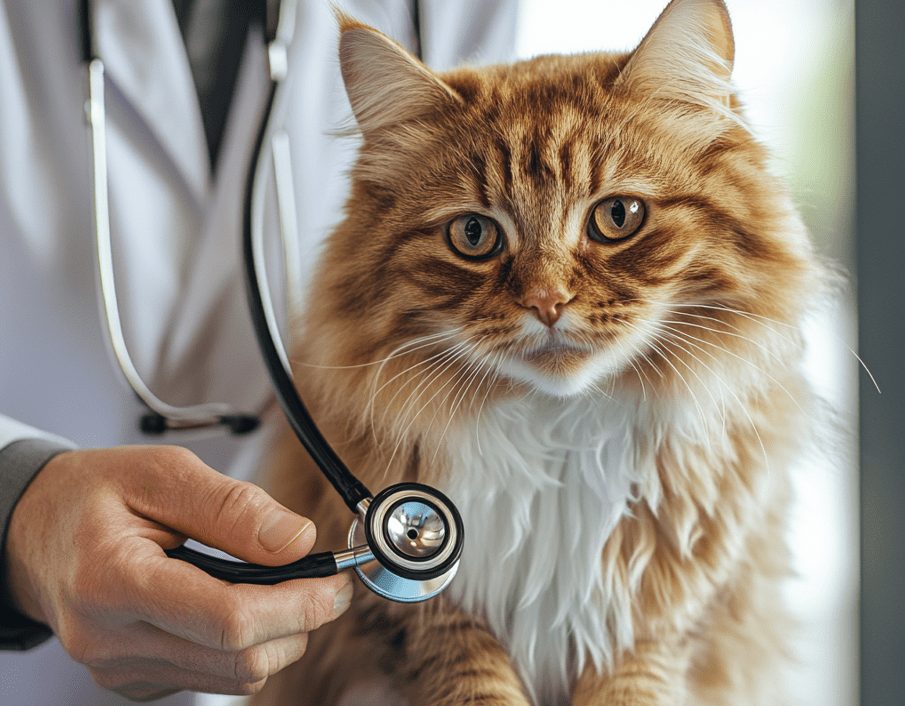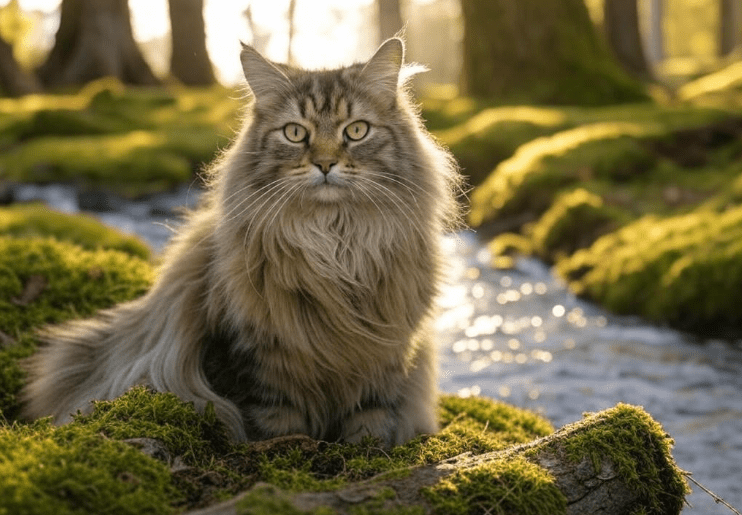
Maine Coon skin issues can be a significant concern for owners of this majestic, long-haired breed. Known for their friendly demeanor and tufted ears, Maine Coons are prone to specific dermatological problems due to their thick coats and genetic predispositions. Understanding the causes and treatments of these skin conditions is essential for maintaining your cat’s health and comfort. This comprehensive guide explores common Maine Coon skin problems, their triggers, and effective solutions to ensure your feline friend thrives.
Introduction to Maine Coon Skin Health
Maine Coons, often called “gentle giants,” are one of the largest domesticated cat breeds, with luxurious coats that require diligent care. Their dense, water-repellent fur can hide skin issues, making regular grooming and observation critical. Skin problems in Maine Coons can stem from allergies, parasites, infections, or genetic factors. Left untreated, these issues can lead to discomfort, excessive scratching, and secondary infections. By recognizing symptoms early and seeking appropriate treatments, you can keep your Maine Coon’s skin healthy and their coat vibrant.
Common Maine Coon Skin Issues
1. Allergies
Allergies are a leading cause of skin problems in Maine Coons. These can be triggered by environmental factors, food, or fleas.
Environmental Allergies (Atopic Dermatitis): Maine Coons may react to pollen, dust mites, or mold. Symptoms include itching, redness, and hair loss, often around the face, paws, or belly. Seasonal changes can exacerbate these issues.
Food Allergies: Sensitivities to proteins like chicken, beef, or fish can cause skin irritation, hives, or scabs. Food allergies often manifest as chronic ear infections or gastrointestinal upset alongside skin symptoms.
Flea Allergy Dermatitis: Even a single flea bite can trigger intense itching in sensitive Maine Coons, leading to hot spots and hair loss, particularly at the base of the tail.
2. Parasites
Parasites like fleas, mites, or ticks can wreak havoc on a Maine Coon’s skin.
Fleas: Beyond flea allergy dermatitis, fleas can cause widespread itching and skin infections if not controlled.
Mange (Demodectic or Sarcoptic): Mites burrow into the skin, causing hair loss, crusty patches, and intense itching. Demodectic mange is less common but can occur in cats with weakened immune systems.
Ear Mites: These pests cause dark, waxy buildup in the ears, leading to scratching and secondary infections.
3. Bacterial and Fungal Infections
Infections often arise as secondary issues due to scratching or underlying allergies.
Bacterial Infections (Pyoderma): Open wounds from scratching can become infected, causing pustules, redness, or oozing sores.
Ringworm: A fungal infection, ringworm presents as circular, scaly patches with hair loss. It’s highly contagious to other pets and humans.
Yeast Infections: Common in ears or skin folds, yeast infections cause greasy, odorous skin and persistent itching.
4. Genetic Skin Conditions
Maine Coons may inherit conditions like seborrhea, which causes oily or dry, flaky skin. This can lead to a waxy coat, foul odor, and increased risk of infections. Another rare genetic issue is cutaneous asthenia, where the skin is unusually fragile and prone to tearing.
5. Matting and Grooming-Related Issues
The Maine Coon’s thick coat is prone to matting, which can trap moisture and debris, leading to skin irritation or infections. Improper grooming can also cause micro-abrasions, inviting bacteria.
Symptoms to Watch For
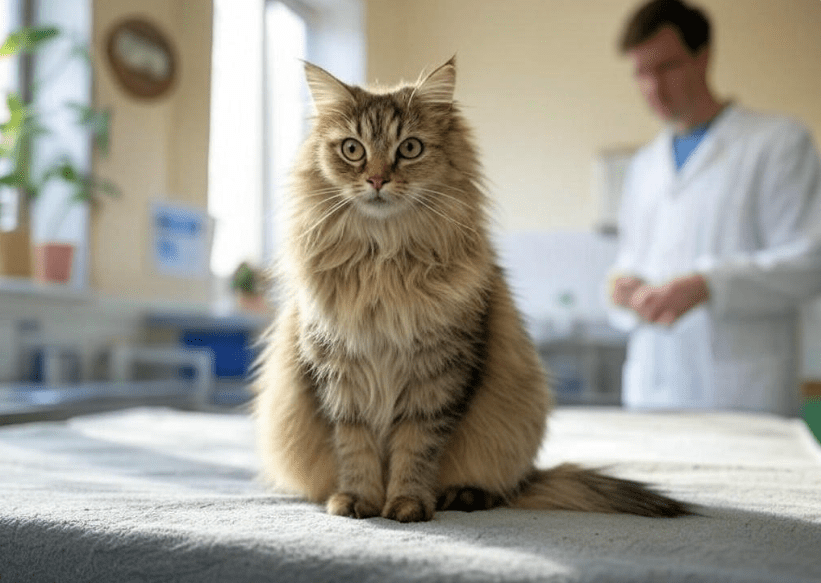
Recognizing the signs of Maine Coon skin issues is the first step toward effective treatment. Common symptoms include:
1.Excessive scratching, licking, or chewing
2.Hair loss or thinning patches
3.Red, inflamed, or scabby skin
4.Oily or flaky coat
5.Foul odor from the skin or ears
6.Crusty or scaly lesions
7.Behavioral changes, such as irritability or lethargy
If your Maine Coon exhibits these signs, consult a veterinarian promptly to identify the root cause and prevent complications.
Causes of Maine Coon Skin Issues
Understanding the triggers behind skin problems helps in crafting targeted treatment plans. Key causes include:
Genetics: Maine Coons may inherit predispositions to allergies or skin disorders like seborrhea.
Diet: Poor-quality diets or food sensitivities can manifest as skin issues. Diets lacking essential fatty acids may dull the coat and dry the skin.
Environment: Exposure to allergens, harsh chemicals, or extreme weather can irritate the skin.
Grooming Neglect: Infrequent brushing or improper bathing can lead to matting and infections.
Stress: Stressful environments can weaken the immune system, making cats more susceptible to skin problems.
Underlying Health Issues: Conditions like hyperthyroidism or diabetes can affect skin health, causing dryness or infections.
Diagnosis of Skin Problems
Veterinarians use a combination of methods to diagnose Maine Coon skin issues:
Physical Examination: Checking for lesions, hair loss, or parasites.
Skin Scrapings: To detect mites or fungal infections.
Allergy Testing: Intradermal tests or blood work to identify environmental or food allergies.
Biopsies: For suspected genetic or autoimmune conditions.
Cultures: To confirm bacterial or fungal infections.
Accurate diagnosis is crucial, as symptoms like itching can stem from multiple causes, requiring distinct treatments.
Treatments for Maine Coon Skin Issues
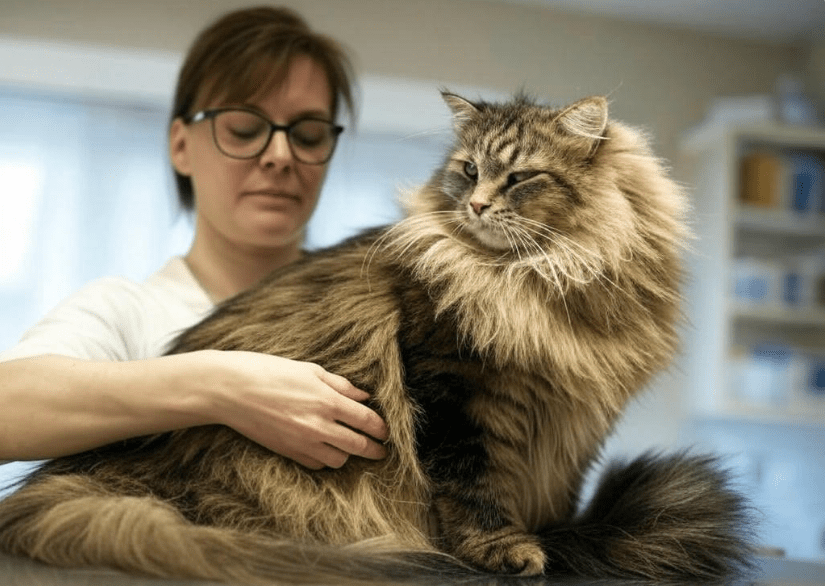
Effective treatment depends on the underlying cause. Here’s a breakdown of common approaches:
1. Allergy Management
Environmental Allergies: Antihistamines, corticosteroids, or immunotherapy (allergy shots) can reduce symptoms. Regular bathing with hypoallergenic shampoos helps remove allergens.
Food Allergies: Switching to a limited-ingredient or hydrolyzed protein diet can resolve symptoms. A vet-guided elimination diet trial (8–12 weeks) identifies trigger foods.
Flea Allergy Dermatitis: Use vet-approved flea preventatives like topical drops or oral medications. Treat the home environment to eliminate fleas.
2. Parasite Control
Fleas and Ticks: Monthly preventatives (e.g., Revolution, Frontline) keep parasites at bay. Wash bedding and vacuum regularly.
Mange: Medicated dips, oral medications, or injections (e.g., ivermectin) treat mites. Isolate affected cats to prevent spread.
Ear Mites: Ear cleaners and topical medications clear infestations. Regular ear cleaning prevents recurrence.
3. Infection Treatment
Bacterial Infections: Antibiotics (oral or topical) clear infections. Medicated shampoos soothe inflamed skin.
Ringworm: Antifungal creams, oral medications, or lime sulfur dips treat ringworm. Environmental decontamination is essential.
Yeast Infections: Antifungal shampoos or ear drops address yeast overgrowth.
4. Genetic Condition Management
Seborrhea: Medicated shampoos, omega-3 supplements, and regular grooming manage symptoms. Severe cases may require oral medications.
Cutaneous Asthenia: No cure exists, but protecting the skin from trauma and using supportive wraps can help.
5. Grooming and Preventive Care
1.Brush your Maine Coon 2–3 times weekly to prevent matting and distribute natural oils.
2.Use cat-safe, hypoallergenic shampoos for baths (every 4–6 weeks or as advised).
3.Trim nails to reduce scratching damage.
4.Provide a balanced diet rich in omega-3 and omega-6 fatty acids to support skin health.
Home Remedies and Supportive Care
While veterinary treatment is essential, supportive home care can alleviate discomfort:
Oatmeal Baths: Soothe itchy skin with colloidal oatmeal-based shampoos.
Coconut Oil: Apply sparingly to dry patches (vet-approved) to moisturize skin.
Humidifiers: Add moisture to the air to prevent dry skin, especially in winter.
Stress Reduction: Provide a calm environment with hiding spots and interactive toys.
Always consult a vet before trying home remedies, as some can worsen conditions if misapplied.
Preventing Maine Coon Skin Issues
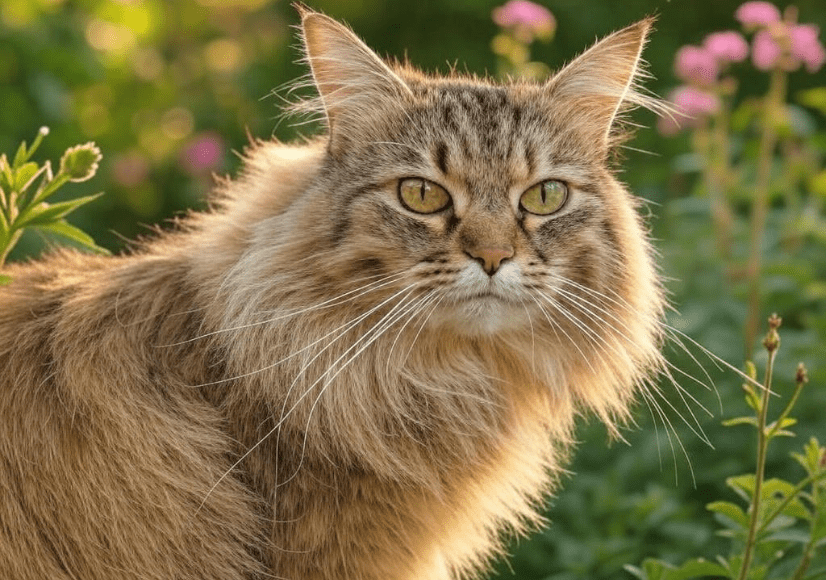
Prevention is key to avoiding recurring skin problems:
Regular Grooming: Brush and inspect the coat for early signs of issues.
Flea Prevention: Use year-round flea control, even for indoor cats.
Balanced Diet: Feed high-quality, vet-recommended food to support skin and coat health.
Allergen Control: Wash bedding, vacuum frequently, and use air purifiers to reduce environmental allergens.
Routine Vet Visits: Annual checkups catch underlying issues before they escalate.
When to See a Veterinarian
Seek veterinary care if your Maine Coon shows:
1.Persistent scratching or hair loss
2.Open sores or foul-smelling skin
3.Changes in appetite or behavior
4.Symptoms that don’t improve with home care
Early intervention prevents complications like chronic infections or scarring.
Conclusion
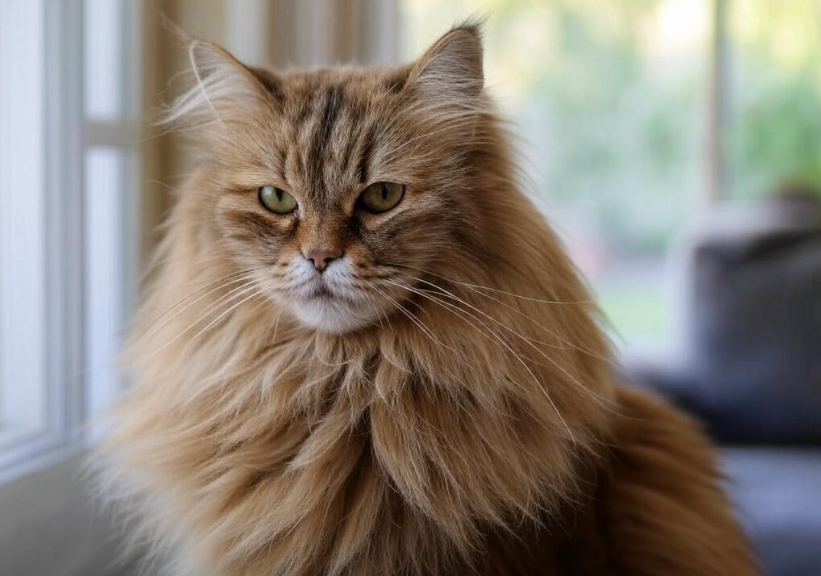
Maine Coon skin issues, from allergies to infections, can challenge even the most dedicated cat owners. By understanding the causes—genetic, environmental, or grooming-related—you can take proactive steps to keep your Maine Coon’s skin healthy. Regular grooming, a balanced diet, and timely veterinary care are your best tools for preventing and treating skin problems. With diligence and love, your Maine Coon can enjoy a comfortable, itch-free life, showcasing their stunning coat in all its glory. Stay vigilant, and consult your vet at the first sign of trouble to ensure your gentle giant thrives.




